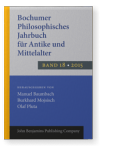Platons Darlegung des Sokratischen ‚Umsonst‘ in den Dialogen der ersten Tetralogie (Euthyphron, Apologie, Kriton und Phaidon)
The author interprets the dialogues belonging to Plato’s first Tetralogy, i. e. Euthyphro,
Apology, Crito and Phaedo, as a coherent whole, in which the concept of ‘gratuitousness’
plays the leading role. The expression ‘gratuitous’ does not mean here, however,
‘arbitrary’ or ‘as someone likes’ but rather ‘free’, ‘gratis’, ‘for nothing’. Based on
such an interpretation the author discusses then the important similarities existing
between – on the one hand – Plato’s metaphysics of ‘gratuitousness’ and – on
the other hand – Meister Eckhart’s ‘mystics’ (in which the concept of ‘why-less’
being [wesen sunder warumbe] is crucial) and Schelling’s Philosophy of Identity
(in which the concept of ‘absolute’ being plays the fundamental role). These three
thinkers are all interested in the world as it is not merely for us or for something
else – that is not in the world as it merely appears to someone under particular
given conditions –, but in the world as it is in itself. However, this distinction
between ‘appearances’ and ‘things-in-themselves’ is not to be thought as an epistemological
but rather as an ethical or existential one, which is not related to the
way how we ‘can know’ the world but rather to the way how we ‘should live’ in it.
Article language: German
